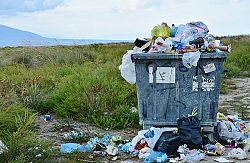

The Joint Unit for Waste Crime (JUWC) has celebrated its first anniversary.
Its role, encompassing the whole of the UK, has been to crack down on criminals and gangs who commit serious and organised waste crime, and it has enjoyed a successful year despite the COVID-19 pandemic.
Launched in January 2020, the multi-agency taskforce was the first of its kind to formally bring together environmental regulators and law enforcement agencies to tackle serious and organised waste crime which is estimated to cost the UK economy at least £600 million a year and cause great harm to the environment, local communities and businesses.
Despite the Joint Unit just starting out when the Covid-19 pandemic struck, the taskforce wasted no time in sharing intelligence, identifying illegal activity and conducting numerous operations to disrupt illegal activities, leading to arrests of suspected waste criminals and bringing them to justice. The taskforce has also strengthened in number, with the British Transport Police and the Northern Ireland Environment Agency (NIEA) joining the Unit in September.
JUWC comment
Nicola Lawton, JUWC Deputy Director for Enforcement, said:
"The JUWC is crucial to our fight against serious and organised waste crime, and despite the Covid-19 pandemic we have continued to target and disrupt the criminal networks who are undermining the waste industry and the environment.
"In the last year we have conducted numerous multi-agency operations against groups and individuals who are causing serious harm, and the Unit is now leading over 20 operations into offending that spans the UK and involves not only waste crime but other criminal activities including firearms, drugs, vehicle theft and money laundering.
"The Joint Unit has entered 2021 stronger and more determined than ever to tackle those engaged in serious and organised waste crime."
Partners of the JUWC
The JUWC is comprised of eight partners: the Environment Agency, Natural Resources Wales, the Scottish Environment Protection Agency (SEPA), the NIEA, the police, the National Crime Agency, HM Revenue & Customs (HMRC) and the British Transport Police.
JUWC case studies
A large proportion of waste crime is carried out by gangs and individuals who operate bogus waste services, accepting payment for disposal without having the necessary permits for transportation or storage.
Waste is then illegally dumped on private and public land to avoid fees and landfill taxes, which causes significant harm to businesses, local communities and the environment.
Here are some of examples of the work of the JUWC over the past year:
In May 2020, the JUWC started an investigation into a hostile waste operation where local Environment Agency officers had previously been intimidated and threatened. JUWC officers began a surveillance operation and worked with the local council, HMRC, the DVSA and the RSPCA on a targeted plan for the site. This led to a warrant being executed in August 2020 by JUWC officers and the police.
The JUWC are now reviewing the evidence gathered and will take enforcement action for any offences committed.
In September 2020, the JUWC was invited by the Government Agency Intelligence Network to attend a site raid in Kent which was supported by over 300 Metropolitan Police firearms officers. Seven people were arrested on suspicion of an array of offences after police discovered drugs, stolen vehicles and an arsenal of weapons including a loaded shotgun, 17 air weapons, CS gas and a machete.
Two people found at the site were cared for by the force's modern slavery team and 49 stolen dogs seized, with most now returned to their owners.
In October 2020, JUWC officers from the Environment Agency and the British Transport Police undertook a week of action tackling waste and metal crime.
Over 1,100 vehicles were stopped and 550 sites were visited. Over 150 offences were detected and 29 arrests made.
Additional role of the Environment Agency
In addition to the JUWC, the Environment Agency also conducts its own operations to disrupt criminal waste activity.
In 2019, the Environment Agency stopped illegal waste activity at 912 sites - 12% more than the previous year.
As a result of prosecutions taken by the Environment Agency, businesses and individuals were fined almost £2.8 million for environmental offences in 2018.